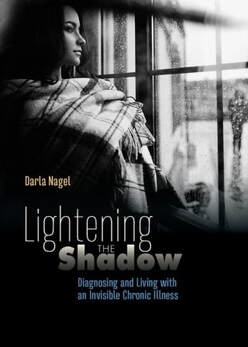|
I threw away my benzoyl peroxide acne cream a couple of weeks ago, and so far, I see no difference in the amount or type of zits on my face, back, and chest. I didn't have bad acne as a teen, but I did, suddenly, in my twenties. Maybe all the acne creams, and diet changes, I tried this past decade were a waste of time, as someone with a systemic chronic illness affecting immunity. But as a young woman in a country highly valuing beauty, I felt pressure to keep trying. Now, I say if you want to leave your acne alone, leave it alone. If it's part of you, be you. Don't waste money, energy, and time changing something if it can't be changed. That's the gist, but if you're curious about my late-onset acne, here's how it started, as recorded in my book: I faced a challenge to my more positive attitude when a new symptom began in June. At first, I thought it was a rash on my face. But as it emerged on my chest, upper arms, neck, and back, I examined it, discovering it was acne, the worst acne I’d ever had. Each new spot took about a month to fade. I tried several over-the-counter creams and diluted tea tree oil, a natural remedy I’d found online, but none worked. Suddenly, I looked fifteen instead of twenty-one. I’d always been thankful that my illness hadn’t affected my appearance or made people stare at me. Now my appearance had changed so much that for the first time, I wanted to wear makeup besides lip gloss and was embarrassed to be seen in a swimsuit. Darla Nagel is a biomedical copy editor who has an invisible chronic illness. She wants to educate healthcare professionals and encourage patients. If you want to receive quarterly updates from her, email darla.nagel{a}gmail.com.
0 Comments
The Friday before Mother’s Day 14 years ago, I felt like I was coming down with something. A week later, as I wrote in my book: I don’t feel tired; I feel stunned on the ground from body slamming a brick wall. I feel fifty years older. I feel unplugged in the dark. That’s how I felt while combing my hair in the YMCA locker room after one of my hour-long swims. What I actually thought was Maybe this is more than a cold. I’m whipped, and my legs are sore, even though I didn’t swim as hard today. Usually, swimming made me feel calm and strong, without causing sweating, even after the two-hour practices I’d done on my high school swim team….But I’d had this cold, which was mild except for utter exhaustion that made me not want to do anything involving physical or cognitive effort…. I didn’t learn my diagnosis until two years and five months had passed and my condition had worsened. Two years represented a tenth of my life. Falling ill at age nineteen was like having my wings chopped off just as I was taking flight. Maybe the timing would’ve been worse if they had been chopped when I was hundreds of feet in the air, a year into a career in a city far from my parents. But I would’ve liked to soar through the air. If that sounds like the start of a story about long COVID, you’re partially right. Long COVID and ME/CFS have much in common, chiefly, an overwhelming and flawed bodily response to a virus. ME/CFS is just as real and just as detrimental. Even after 14 years, some people don’t know what ME/CFS is and don’t know that I’ve written a book that is meant to help young people living with any invisible chronic illness. Don’t spend another 14 years in the dark. Read my book for a personal lesson, or see the Resources section for online information. Darla Nagel is a biomedical copy editor who has an invisible chronic illness. She wants to help other patients and enlighten health care professionals about our experiences. If you’d like to receive quarterly updates from her, sign up by emailing darla.nagel {a} gmail.com.
A quick guide to the benefits of a plant-based diet or vegan diet for health, for the environment, and even for your grocery budget can be found in Natural Awakenings. Click here to read "Veggies for the Win." Darla Nagel is a biomedical copy editor who has an invisible chronic illness. She wants to educate healthcare professionals and encourage patients. If you want to receive quarterly updates from her, email darla{dot}nagel{a}gmail.com.
I used to think inability to reproduce naturally didn’t constitute a physical disability. Now I think infertility is a physical and emotional disability for both husband and wife. It carries a high emotional and financial toll with so many uncontrollable factors. I never thought IVF would take place in my Christian family, but now it has, with all of its hurdles and doctors and needles. The couple within my family is now at the second-to-last hurdle: a “lining check” to see whether embryo implantation should be attempted. I am praying for the best outcome for this couple and their “snowflake babies.” Join me in this prayer and in appreciation of the gift of life from our Creator. Darla Nagel is a biomedical copy editor who has an invisible chronic illness. She wants to educate healthcare professionals and encourage patients. If you want to receive quarterly updates from her, email darla{dot}nagel{a}gmail.com.
I graduated from college 10 years ago and was so ill that the first thing I did upon arriving home was go to bed. In fact, that is the last memory I have of that month, other than receiving a diploma frame for Christmas. I was so broke—but free of student loan debt—that I had $100 in my checking account and a desperation to find work. I wondered whether I’d have any pleasant memories of college or only remember the drudgery. I’m much healthier, much wealthier, and much happier now. I’m asking what’s next for me. In the next five years, I intend to make four music videos, take three graduate-level courses in nutrition and the business of publishing, expand two pages on MEpedia, and write one book. My ambition is back, and my health is just about there. I’m not letting my education go to waste. I’m moving forward, yet I’ll keep a presence back here to support my readers. I want the best for your health and future, too! Darla Nagel is a biomedical copy editor who has an invisible chronic illness. She wants to educate healthcare professionals and encourage patients. If you want to receive quarterly updates from her, email darla.nagel{a}gmail.com.
For the first time, I edited subtitles on a company YouTube video to better reflect what the speaker and interviewer said. I've wanted to make my company's content more accessible for some time, and it was easy to learn how to use YouTube's subtitle editor tool. One video down, about 160 more to go. Some of the speakers are going to have heavy accents or discuss specific scientific terminology, meaning auto-generated subtitles won't be sufficient. I'm excited to make each subtitle accessible for people who prefer captioned videos. In the past month, I also educated a local publisher on what alt text is and is for. Alt text is not something my company is adding to content, but for companies with the human and technology resources to add it, alt text is another important accessibility action item. If my own website is missing some accessibility feature, please let me know in a comment! Darla Nagel is a biomedical copy editor who has an invisible chronic illness. She wants to educate healthcare professionals and encourage patients. If you want to receive quarterly updates from her, email darla.nagel{a}gmail.com.
Here's a new study on the role of Epstein-Barr virus and human herpesvirus 6 in ME/CFS, specifically by altering germinal center and extrafollicular antibody responses. I copyedited this. It has a helpful Graphical abstract (explanatory diagram). See the full article here: https://insight.jci.org/articles/view/158193 It is wonderful to see more research coming out on ME. This is the second such study I have copyedited this year. Darla Nagel is a biomedical copy editor who has an invisible chronic illness. She wants to educate healthcare professionals and encourage patients. If you want to receive quarterly updates from her, email darla.nagel{a}gmail.com.
I finally got to copyedit a research study on ME/CFS! Dr. Maureen Hanson and her team published a study on metabolism in patients with ME before and after two days of strenuous exercise in the journal I copyedit for, JCI Insight. Read it here. I’ll summarize what I took away from reading the article multiple times. Direct any questions to the article authors, not to me, because I am not a scientist or clinician. Glutamate and vitamin B3 metabolism differed between patients and healthy controls, but there was no evidence for overall hypometabolism. In female patients, the data showed a gradual altering of something called the plasma metabolome resulting from exercise stress. There may be less passing of electrons through mitochondrial membranes in patients. Overall, exercise recovery is impaired in patients. I am grateful for any research published on ME, and to my mind, the only positive result from the pandemic is the heightened interest in ME research because of the similarities between long COVID and ME. I look forward to my next opportunity to copyedit an ME study for JCI Insight. Darla Nagel is a biomedical copy editor who has an invisible chronic illness. She wants to educate healthcare professionals and encourage patients. If you want to receive quarterly updates from her, email darla.nagel{a}gmail.com.
Breath awareness, which is as simple as noting whether you’re breathing out or breathing in, is the foundation of yoga therapy, as I learned from interviewing yoga therapist and educator Veronica Zador. Read the interview published in Natural Awakenings here. Breathing is also the foundation of yoga and a requirement for mindfulness and for the heart/mind connection in health. I think breath awareness is the reason I feel strong and feel connected to my body when I swim and sing. You have to breathe to avoid drowning! You have to breathe to make vocal music audible and controlled. So, stop reading and clicking for 10 seconds, and notice whether you’re breathing in or breathing out. That’s your first step toward better health. Darla Nagel is a biomedical copy editor who has an invisible chronic illness. She wants to educate healthcare professionals and encourage patients. If you want to receive quarterly updates from her, email darla.nagel {a} gmail.com.
For too long, I've let pain affect my functioning. Whether that pain was from joints, muscles, or frequent sinus headaches, I can no longer let that pain get in my way when there are things I can do to reduce the pain. So, my New Year's resolution is to do what it takes to stop pain from holding me back. I don't have many specifics for modalities that I will try this year that I have not tried before, but I am open to new possibilities. I hope you will join me as well. No one deserves to live with chronic pain. I hope that this will be more successful than last year's resolution to greatly reduce my sugar and gluten intake! Darla Nagel is a biomedical copy editor who has an invisible chronic illness. She wants to educate healthcare professionals and encourage patients. If you want to receive quarterly updates from her, email darla.nagel{a}gmail.com.
|
Author:
|



 RSS Feed
RSS Feed